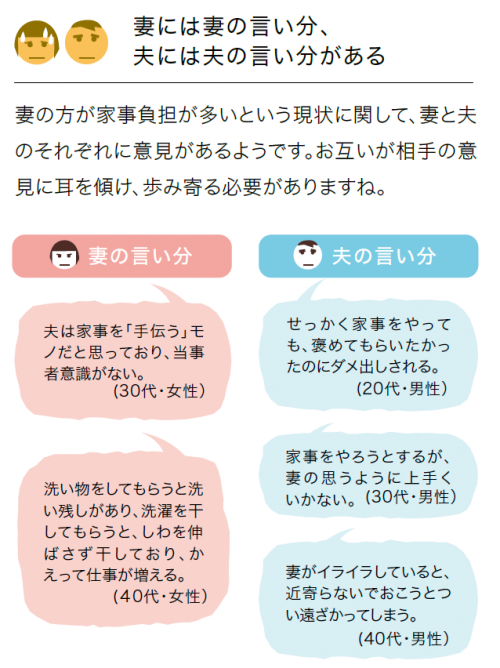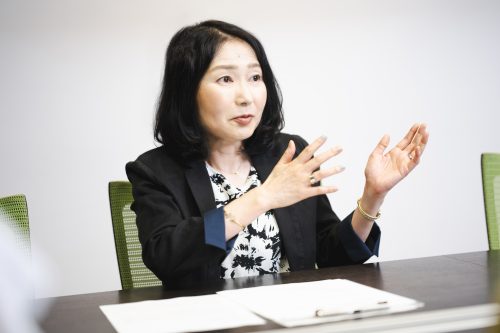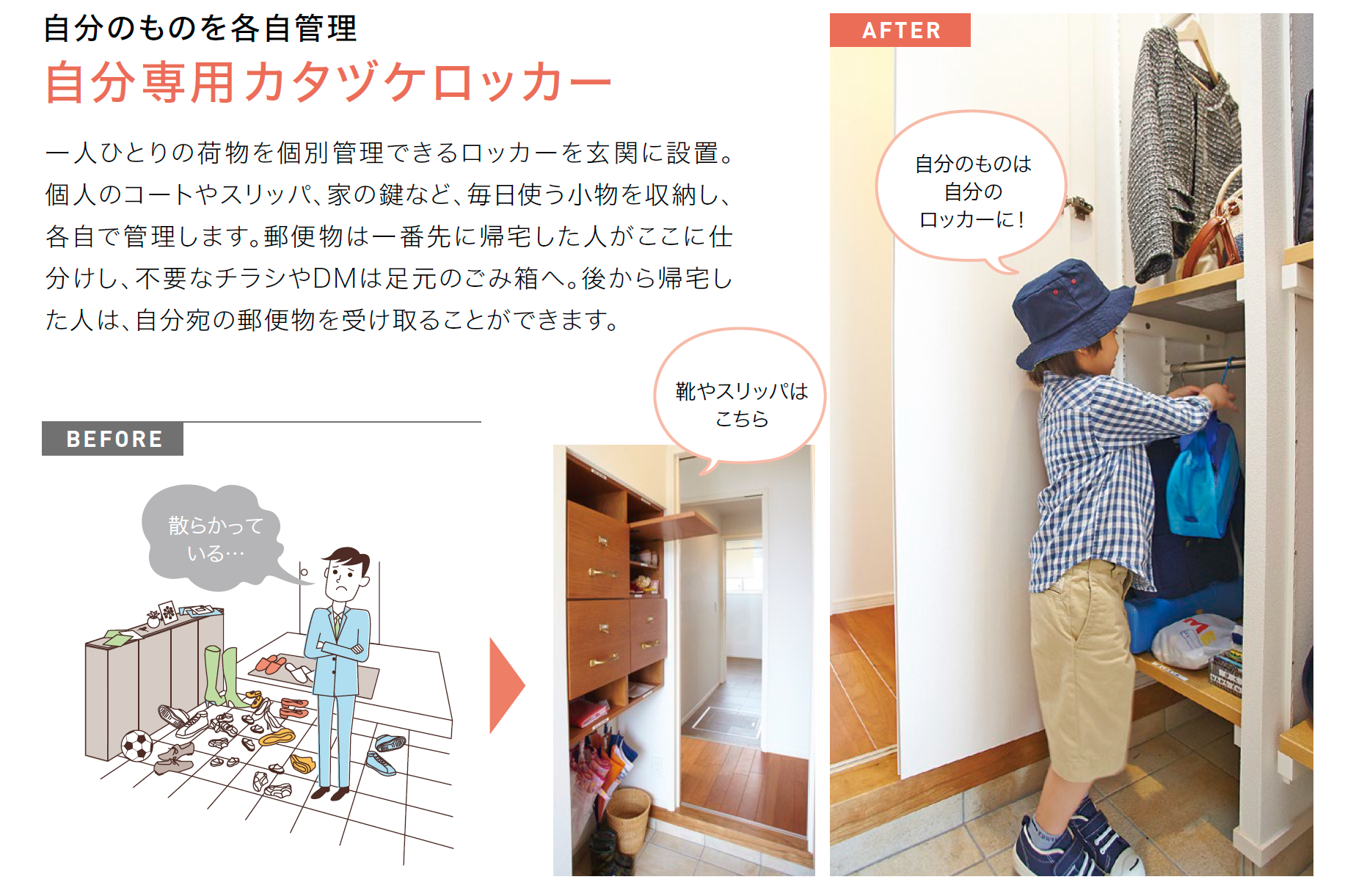We interviewed Ms. Ayako Tada of Daiwa House Industry Co.
This is how “Housework with No Name” was born!

Have you ever had the experience of leaving a small amount of toilet paper or barley tea in the refrigerator to be replaced by the next person? Thinking back, I used to do this when I was a child (laughs).
Work that is being done by “someone” in the house that you notice. Or, work that is left untouched, thinking that “someone else will do it for me. These unnamed, detailed tasks tend to be omitted. As we discussed the “Housework Share House*” project, we realized that it is these unnamed chores that are actually a major burden. We came up with the term “nameless chores” in an effort to “visualize” the problem by giving it an easy-to-understand name and share it with others.
(*) Housework share house (Daiwa House)
The “nameless chores” take a toll on the mind.
In 2017, we conducted a survey of 600 dual-earner households across Japan on their attitudes toward housework. We found that husbands perceive their participation in housework as “30% for husbands and 70% for wives,” while wives perceive it as “10% for husbands and 90% for wives,” indicating a large gap between husbands and wives, and that 90% of “unnamed household chores” are also borne by the wives.
With the rapid increase in the number of dual-earner households, more and more families are sharing household chores between husband and wife. However, when deciding on the division of chores, unnamed detailed tasks are omitted, and in many families, the burden tends to fall disproportionately on the wife who realizes that she is responsible for them. Most of those who feel burdened with housework also feel an emotional burden, saying that they never get it done and that no one in the family appreciates their efforts.
This will work! 4 Key Points of Housework Sharing
Husbands and wives may have their own arguments about housework, but it is important to compromise with each other. Here are some tips for resolving the “chore with no name” confusion and sharing household chores effectively.

When asking for help, be specific: “When you hang the laundry, stretch out the wrinkles,” or “When you take out the trash, put in a new trash bag,” etc. This will reduce omissions. This will reduce the amount of housework that is left undone, and eliminate both the wife’s complaint that she has to do more work because she has to redo half of what she has done, and the husband’s argument that he is not thanked for his hard work, but rather told he is not doing a good job.
(2) Praise even the smallest things
“Thank you for wiping the table,” “Thank you for folding the laundry as I asked,” etc. Keep praising them out loud. Many people are more motivated when they receive praise.
(iii) Sharing information
It is also a good idea to share small things such as “I ran the washing machine” or “We are running out of detergent” in a family social networking group, or to place a bulletin board in the living room or hallway. Bulletin boards are especially good because they are easy to see at a glance, and the handwritten text conveys a sense of care and appreciation for each other.
4) Expressing gratitude with words
It is easy to think that you are too shy to say “thank you” now, or that it will be understood even if you don’t say it…. However, when we say “thank you” in words, not only do we make each other feel good, but other family members who hear it will also realize that someone else has done it, and will think about doing it themselves next time. I believe that more words of gratitude in the home will lead to good family relationships.
The “No-Name Housework Outbreak!” Fun to say out loud!
This is an example in my family. When a tissue runs out and the task of setting a new tissue occurs, the person who notices says, “Ah! A household chore with no name occurs~” and we jokingly say it out loud so that everyone in the family can hear. If we do it silently, no one notices or appreciates it, but by saying it out loud, everyone can share it, and it somehow becomes fun.
In addition, the evolution of home appliances has created new “nameless chores” such as “cleaning and changing filters.
When we purchased the latest drum-type washing machine and robot vacuum cleaner, I asked my husband to choose one and entrusted him with the laundry and cleaning, including care of the appliances, saying, “I don’t know how to operate it, so please take care of it for me. Since then, my husband has taken the initiative in cleaning the washing machine filters!

What “Housework Share House” aims to achieve
At our Toyama branch, where there are many dual-earner households in Japan, a female-centered project was launched and the “Housework Share House” was born out of a concern about why the burden of housework has not decreased at all, even though husbands are cooperative in housework while working together. The house was designed to make it a habit to “do one’s own thing,” and a “housework sharing flow line” was created to naturally eliminate “nameless chores” such as “putting away shoes and socks left on the floor” that tend to occur before the husband arrives at the living room from the entrance upon his return. The “Katazuke Locker” is a locker that allows each resident to manage his or her own belongings individually. By making some modifications to the home, the whole family will be able to engage in household chores naturally.

The “Nameless Household Specter” popular among children
The “nameless housework yokai” was created to have children enjoy knowing and learning. The goal is to create awareness and communication, such as “This is also a housework,” and “Let’s exterminate this yokai.

We have placed various “nameless housework monsters,” such as empty boxes of tissues, in the model building of the “Housework Share House,” and ask “How many can you find? We also hold events where people can participate in housework at playful intervals, such as “How many can you find?
I hope that by the time today’s children reach the age of having families, an environment in which they are confronted with housework will be commonplace, and that the term “nameless housework” will have become a household word in the world.
Let’s all share our thoughts on “Housework with No Name.”
The reason we chose the name “nameless chores” is that we want people to make chores, including nameless chores, their own and those of their families. A woman who participated in one of our events once told us, “It was ‘nameless chores’ that had been tormenting us. I was once told, “You did a good job giving it a name. By giving it a name, it became possible for everyone to share the blurred feelings that we had all been feeling as a common language.
I heard that the Tokyo Metropolitan Government is working to raise awareness of “household chores with no names,” and I am hopeful that even more people will recognize this as a social issue. I am also looking forward to seeing what kind of catch phrases will be gathered for the “Housework with No Name” campaign. We would love to hear from many of you about your frustrations and feelings of gratitude for the “nameless chores.
Ms.Tada participated as a judge! Tokyo Metropolitan Government solicited everyone’s voices and ideas about “Housework with No Name”!

Ayako Tada
Senior Manager, Marketing Office, Housing Business Division, Daiwa House Industry Co.
After working at a design site, he has been in charge of all aspects of storage from planning to development and sales since 2005. Utilizing the know-how cultivated at that time, he is currently in charge of “Housework Share House” originated from Toyama branch as an advocate of “Housework with No Name” and is now expanding the program nationwide. First-class architect and interior coordinator.












